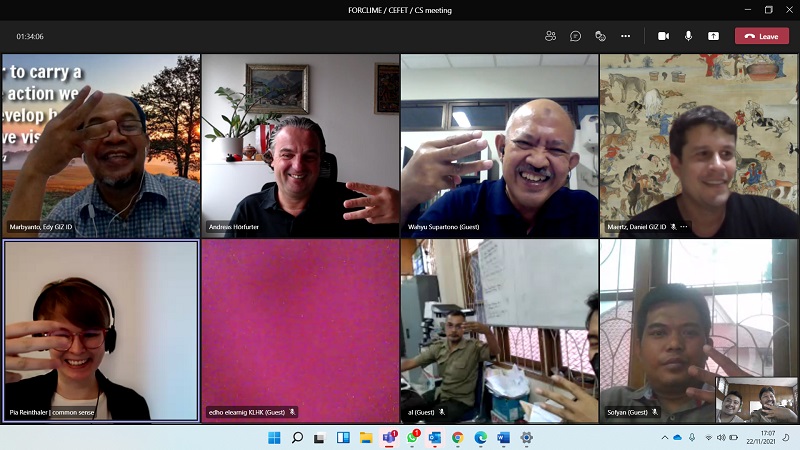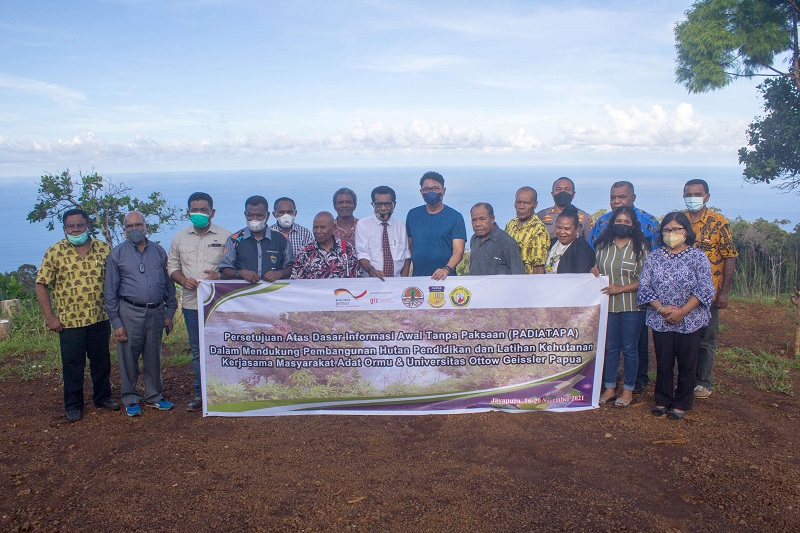FORCLIME
Forests and Climate Change ProgrammeTechnical Cooperation (TC Module)

Select your language

With the purpose of enhancing knowledge regarding the various rights and duties of forest farmer groups (KTH) around the Tabo-Tabo Training Forest, the Environment and Forestry Training Center in Makassar (BDLHK Makassar) held a two-day workshop from 16 - 17 November 2021 within the village of Tabo-Tabo in South Sulawesi. The head of BDLHK Makassar opened the meeting on Tuesday morning via Zoom video conferencing. The training workshop, which was supported by FORCLIME, involved three participating groups of forest farmers, specifically Deswita, Mattiro Deceng and Mappaenre Dalle.
The forest farmer groups within this area have a huge potential as regards the development of small-scale local businesses working with palm sugar, honey and cashew nut production, as well as tourism. Said small businesses also have the potential to make a significant contribution to boosting the incomes of the local population.
The workshop participants received training in institutional management (i.e. accounting, human resource management and team building), business management (including marketing) and quality management. The participants also received training in the basic principles of KTH, specifically the administration of forest farmer groups and the development of group work plans. In addition, the participants received input regarding the rights and duties of KTH, including the necessary application steps for projects, as well as various possible courses of action relating to business development.
Mr Arifin from KTH Mappaenre Dalle stated during the meeting that, ‘During this training session, I learned a lot about the development of farmers groups and the marketing of products. I hope that we get to enjoy more practice during future training sessions’.
For more information, please contact:
Daniel Maertz, Adviser for Adult Education and Training
Edy Marbyanto, Strategic Area Manager for Human Capacity Development

In 2014 the Forestry Education and Training Center entered the world of E-Learning. As a result, the monitoring and evaluation of the implementation of these E-learning activities has become necessary. The implementation of this Monev is supported by GIZ through CommonSense, an experienced consultant in this field. As a part of efforts in line with the preparation of the Monev on the implementation of E-Learning activities, the Environmental and Forestry Education and Training Center (Pusdiklat LHK), in conjunction with FORCLIME and CommonSense, held a first online meeting on Monday – Tuesday, 22 – 23 November 2021. This meeting was the first to be held since CommonSense provided assistance in relation to similar activities during the 2014 - 2016 period. CommonSense is expected to be able to provide E-learning development assistance services at the LHK Education and Training Center during the 2021 - 2023 period.
During this time, CommonSense will support the development of e-Learning through the capacity building of the E-learning Team and Widyaiswara, the development of the Learning Management System (LMS) and the development of LMS learning policies and guidelines.
For further information, please contact:
Edy Marbyanto, Strategic Area Manager for Human Capacity Development
Wira Hakim, Junior Adviser for Human Capacity Development

The educational forest development initiative has been operating since 2019 when the customary community known as the Necheibe Ormu proposed that their forest should be managed by the University of Ottow Geissler Papua (UOGP) as an educational and research forest for the UOGP academic community and other stakeholders. The proposal for the development of the educational forest was followed up by UOGP during a series of meetings, including meetings with the Forestry and Environment Service (DKLH), the Papua Natural Resources Conservation Center (BBKSDA) and other relevant parties, in order to seek legitimacy and follow-up recommendations regarding plans to develop an educational forest.
In terms of the development of educational forests, the University of Ottow Geissler Papua has recently been engaging in outreach through public consultations, as well as Free, Prior, Informed and Consent (FPIC) initiatives. These activities, which were inaugurated by Deputy Chancellor I of the University of Ottow Geissler Papua, George. M. Satya, M.Sc., Ph.D., were conducted over a five-day period from 16 - 20 November 2021 at Pasir 6 North Jayapura, Papua.
The implementation of FPIC activities involved various parties who are closely related to the location of the educational forest in both legal and customary senses. In addition to the holders of ulayat rights and the UOGP, also present were a number of community groups living around the area of the educational forest. The FPIC event aimed to ensure that there were no overlaps and to seek support from local stakeholders. The educational forest is located at Pasir 6, Tanjung Ria Village, North Jayapura. As a result of the FPIC process, the area that has now been agreed through processes of participatory mapping comprises some 144.92 Ha.
Furthermore, through this FPIC activity, some follow up actions have been identified:
1. The Necheibe Ormu customary community agreed to apply the FPIC principles during the management of the educational forest.
2. A participatory mapping structure for the educational forest, which is known as the “Nyei Toro”, was decided.
3. A priority work programme and the zoning of the “Nyei Toro” educational forest were set.
4. Minutes of validation for the “Nyei Toro” Educational Forest Participatory Map and Minutes of FPIC Management for the “Nyei Toro” Educational Forest were completed.
5. Agreements were reached regarding implementation and monitoring strategies for the management of the “Nyei Toro” educational forest.
For more information, please contact:
Ruben Yogi, Junior Adviser for GIS and Forest Mapping
Mohammad Sidiq, Strategic Area Manager for Sustainable Forest Management and Coordinator for Papua and West Papua Provinces
 |
Supported By: |
  |